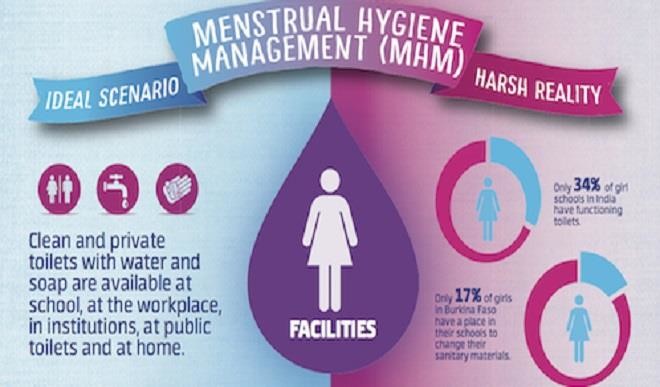Need to educate girls on menstrual hygiene
A secondary school student, Mimido Mercy, who has reached the age of puberty and now experiences monthly menstrual flow makes use of one sanitary pad daily and faces the challenge of lack of water in her school and so substitutes it with buying a sachet of water whenever she needs to tidy up. The 13-year-old […]


A secondary school student, Mimido Mercy, who has reached the age of puberty and now experiences monthly menstrual flow makes use of one sanitary pad daily and faces the challenge of lack of water in her school and so substitutes it with buying a sachet of water whenever she needs to tidy up.
The 13-year-old said, “We buy sachet water whenever we are in our period because there is no water in our school.”
Another student, 15-year-Uchenna Eze, said, “We cannot assimilate well when we are on, most of us are distracted because you may think you are stained. It affects us a lot; and when we are not happy, we cannot grasp what we are being taught. Many of us even get stained during school hours, and we have to start going home so that we will not be booed by the boys.”
Uchenna wants boys to be educated so that they will know that menstruating is a normal process and that “they don’t need to make jest of us when we get stained.”
The onset of menstruation is one of the most important changes occurring in girls during adolescent years. The first menstruation (menarche) occurs between 11 and 15 years with a mean of 13 years. However, recent research reveals that girls are now getting their first period earlier and scientists have identified a few key reasons why the onset of puberty is happening at younger ages.
Menstruation is regarded as unclean, dirty and is even a taboo in some societies across the world. Although menstruation is a natural process, it is linked with several misconceptions and practices, which sometimes result in adverse health issues.
Therefore, the manner in which a girl learns about menstruation and its associated changes may have an impact on her response to it.
Menstrual hygiene is important and calls for attention because it is all about health. It is about helping girls to manage menstruation in a way that does not put them at risk of infection. More specifically, it is about reproductive health and keeping girls healthy through puberty so that they have a greater chance of surviving childbirth. It is also about keeping girls safe from early and unwanted pregnancy by making sure that they have access to information that helps them understand the connection between menstruation and fertility.
From time immemorial, menstruation is often not discussed openly and this silence leaves girls ignorant of its biological function. Proper advice and knowledge is often lacking among many girls on their physiology.
The Founder of Public Health Aid Awareness and Organisation (PHAAO), Mrs. Uche Okonma, during one of her awareness programmes, called on government at state and federal levels to provide public schools with adequate toilet facilities so that girls can practice good menstrual hygiene.
At the Junior Secondary School, Galadimawa, Mrs. Okonma charged the students to maintain high level of hygiene during their menstrual cycle.
She said it was very essential for each school to have water and sanitation facilities as this was an important component for meeting one of the Sustainable Development Goals (SDGs).
“When the girl child has access to clean water and basic sanitation, it will take a great weight off her shoulders as she will be comfortable and able to assimilate at a very high speed.”
She further noted that some girls did not know how to use sanitary pad.
Therefore, she said, “As girls, we should learn how to dispose sanitary pad effectively by wrapping or covering it appropriately before disposing it off. It is also very essential to be very neat while having the menstrual cycle.
“Don’t treat or see it as an abomination or stigma .We are calling on men and boys to give the female folk the necessary support to operate during the period as the body may likely react in some rash manner.”
She said school authorities should ensure there were pain relievers to support those that usually had heavy flow and might experience one form of ailment or the other.
